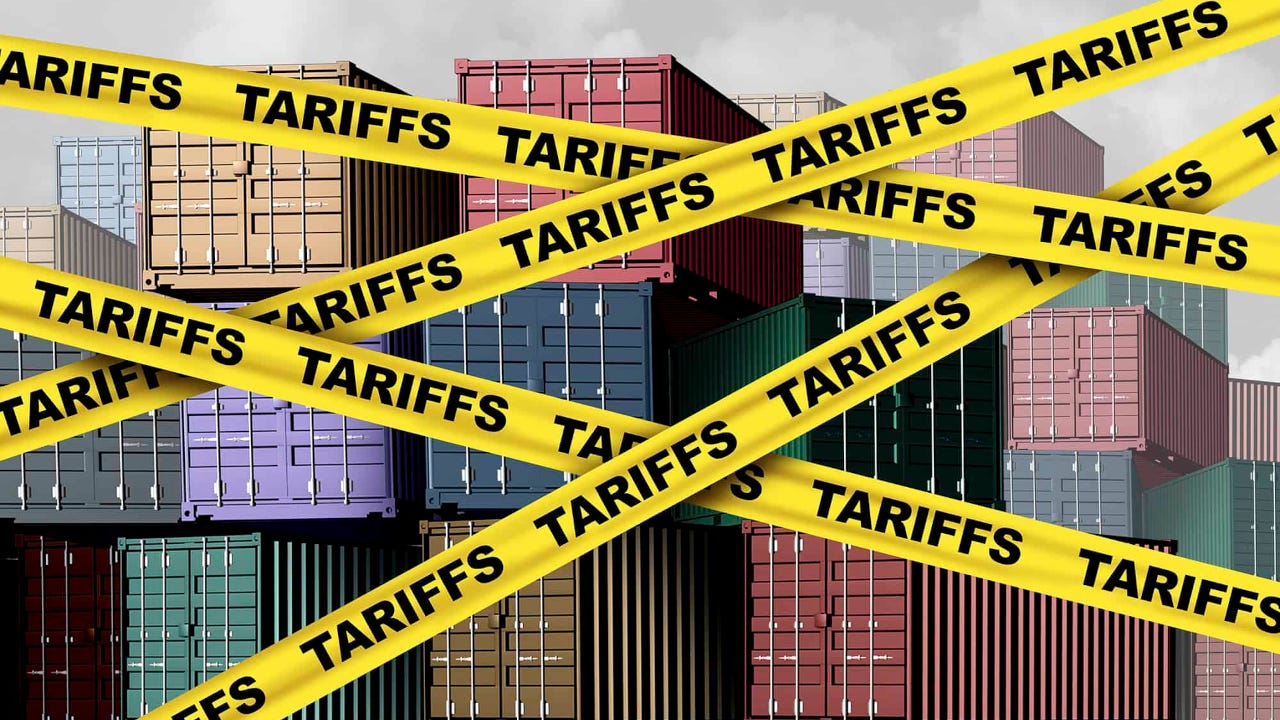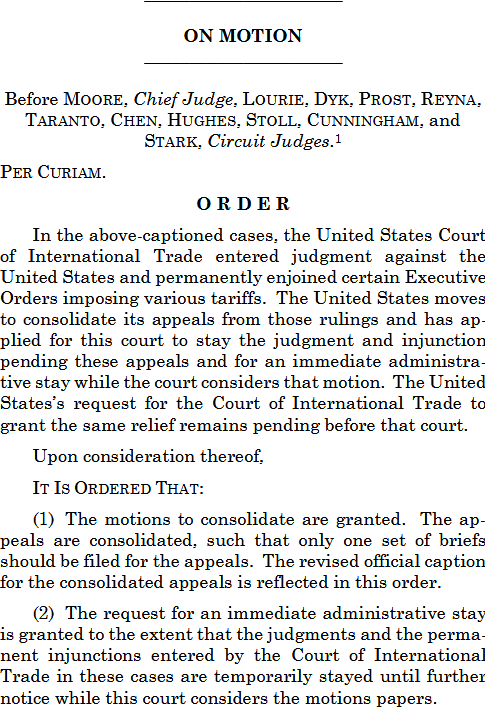The Courts Now Dictate Trade Policy
International Court Of Trade Blatantly Usurps Presidential Powers
Update
And just like that, the Liberation Day Tariffs were restored.
A federal appeals court on Thursday granted the Trump administration’s request to temporarily pause a lower-court ruling that struck down most of President Donald Trump’s tariffs.
The Trump administration had earlier told the U.S. Court of Appeals for the Federal Circuit that it would seek “emergency relief” from the Supreme Court as soon as Friday if the tariff ruling was not quickly put on pause.
The Appellate Court’s per curiam order offered no insight about the Court’s view of the US Court of International Trade unilaterally cancelling all the Liberation Day tariffs and finding limitations on the authorities granted by the International Emergency Economic Powers Act which cannot be found in the original text of the statute. Rather, it was a brief summary order putting the USCIT ruling on hold pending either further court review or an emergency appeal to the US Supreme Court.
Ironically, as much as corporate media accuses Donald Trump of injecting chaos into US trade relations, this time the chaos and uncertainty is being driven by the back-and-forth mercurial nature of court rulings on various aspects of President Trump’s Agenda 47.
Starting Point
The battle between the Trump Administration and the federal judiciary is reaching its inevitable boiling point. The U.S. International Court of Trade and its sweeping ruling proposing to nullify all of the Liberation Day tariffs is less a question of law and more a contest for political supremacy between the Article II Executive Branch and the Article III Judiciary.
A federal trade court on Wednesday blocked President Donald Trump from imposing sweeping tariffs on imports under an emergency-powers law.
The ruling from a three-judge panel at the New York-based Court of International Trade came after several lawsuits arguing Trump has exceeded his authority, left U.S. trade policy dependent on his whims and unleashed economic chaos.
“The Worldwide and Retaliatory Tariff Orders exceed any authority granted to the President by IEEPA to regulate importation by means of tariffs,” the court wrote, referring to the 1977 International Emergency Economic Powers Act.
As is to be expected, President Trump is appealing the ruling.
The ruling is inherently contentious as it is sure to disrupt ongoing trade negotiations between the Trump Administration and multiple US trading partners, as Donald Trump seeks to resolve America’s large and seemingly intractable trade deficit.
The President’s IEEPA powers are defined within the US Code at 50 USC Chapter 35. Most notably, the statutes are largely silent on any limitations with regards to Presidential powers under IEEPA auspices. Fundamentally, the law explicitly states1 that the President may wield IEEPA powers so long as he has declared a national emergency to deal with a perceived economic threat.
Any authority granted to the President by section 1702 of this title may be exercised to deal with any unusual and extraordinary threat, which has its source in whole or substantial part outside the United States, to the national security, foreign policy, or economy of the United States, if the President declares a national emergency with respect to such threat.
As Section 1702 details2, the powers are quite broad and include the power to:
investigate, block during the pendency of an investigation, regulate, direct and compel, nullify, void, prevent or prohibit, any acquisition, holding, withholding, use, transfer, withdrawal, transportation, importation or exportation of, or dealing in, or exercising any right, power, or privilege with respect to, or transactions involving, any property in which any foreign country or a national thereof has any interest by any person, or with respect to any property, subject to the jurisdiction of the United States;
One only needs to examine the Article 1 Section 8 powers delegated to the Congress to understand that the power to “regulate”—an expressly delegated power to Congress with respect to foreign trade—includes the power to tariff.
To regulate Commerce with foreign Nations, and among the several States, and with the Indian Tribes;
More troubling for the courts, however, is the reality that tariff imposition under IEEPA auspices is not new, and even during Trump’s first administration the prevailing view of the law was that it fell to Congress to override Presidential emergency declarations. Emergency declarations are, by design, largely shielded from judicial review; the balance that is struck is that such declarations remain under Congressional review.
If Congress wishes to cancel the Liberation Day tariffs it is always at liberty to do so. If Congress cannot muster the political will to do so it does not fall to the courts to act on behalf of Congress.
The International Court of Trade has taken it upon itself to effectively rewrite the IEEPA, imposing limitations on Presidential authority not defined in the statute itself. The court, rather than Congress, is asserting a review authority over Presidential action and arrogating to itself the power to dictate US trade policy—a power it cannot possess.
Whether the International Court of Trade itself even has jurisdiction over the IEEPA is a question, as the 1980 Congressional act3 creating the court gives it authority to review particular tariffs under ordinary tariff law, but makes no reference to the IEEPA itself—a notable omission given the IEEPA predates the International Court of Trade.
The courts do well to remember that it is the duty of the courts to say what the law is4.
It is the duty of the Congress to say what the law should be.
Hopefully the Supreme Court will see this judicial usurpation for what it is and correct it.
Marbury v. Madison, 5 U.S. 137 (1803)





Once again, Trump needs to invoke the ghost of Andrew Jackson, “the court has made its decision, now let it enforce it.” What’s the worst that might happen? They’ll be mad? The MSM will call him Hitler (I prefer Mango Mussolini) more often? Pundits will declare he is a totalitarian? A fascist? Destroying democracy?
THANK YOU for answering this question of who has the power, Peter. What a genius legal mind you have!
So, do you have some confidence that the Supreme Court will rule correctly, or are they too politicized to be counted on for an accurate interpretation?